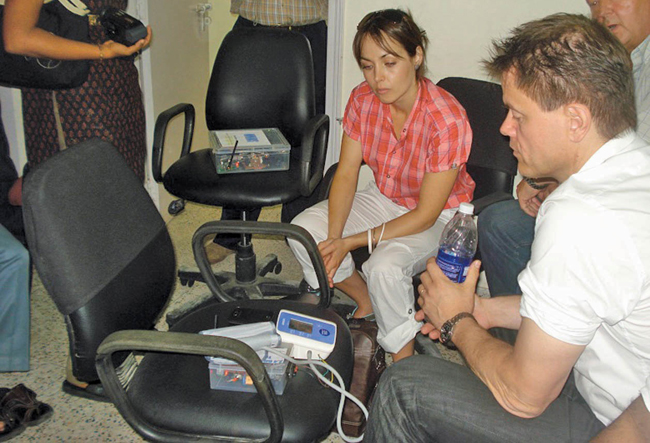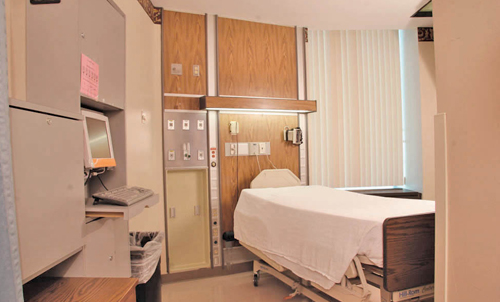Healthcare and technology go hand in hand, but the benefits of technology-enhanced healthcare services have not yet percolated to the rural and remote areas of India. iKure Techsoft, a medical research technology company, is trying to bridge this gap.
iKure Techsoft, in partnership with Aegle Angels Foundation, is setting up intelligent health kiosks in rural areas where healthcare infrastructure is negligent. So rural masses need not travel too far away from diagnostic centers for regular check-ups. So far, the company has installed 15 such kiosks in rural parts of West Bengal.

How do the kiosks Work?
Every kiosk has a rural medical practitioner (RMP) who takes patients’ blood pressure, blood sugar, body temperature, ECG (electrocardiogram), weight, height, and pulse readings with commonly used medical instruments.
On the face of it, it looks like a conventional dispensary, but what makes these facilities unique is the technology that powers these kiosks.
The kiosks are equipped with many interesting and innovative pieces of technology, the most innovative being a handheld device called WHIMS—the wireless health incident monitoring system. It can capture data from a maximum of 16 medical instruments or 16 patients at the same time. The device has been configured to enable automatic digital transmission of data through Zigbee – a wireless protocol.
After WHIMS reads measurements from these instruments, Zigbee automatically transmits all the collected information to a data server, wirelessly. This information (test reports) is stored in the server as the patient’s medical history for future reference, explains Sujay Santra, founder-director, iKure Techsoft.
Based on the test results, the RMP can prescribe medicines. The RMPs are medical practitioners trained and appointed by iKure. They manually enter the analysis and prescription, which is then stored on the server. Medical history records of patients are also stored for future use.
Enabling Healthcare Remotely
For complex cases, the RMP may require to consult a doctor. To deal with such situations, iKure has tied up with The Mission Hospital and Jubilant Kalpataru Hospital, both of which are located in West Bengal. At these hospitals, a team of about eight doctors remotely attends to the cases referred by the RMPs.
If required, the RMP can also consult a specialist stationed at these hospitals via phone after transmitting the patient’s details. The specialist can access the patient’s details directly from the server. If the patient requires special advice on a complicated case, he is referred to the nearest hospital available. In this case, the medical history of the patient along with the line of treatment prescribed by the RMP at the health kiosk (if any) is wirelessly sent to the server. This data can be accessed by the specialist at the hospital through a laptop or mobile phone.
Patients from rural areas usually do not remember details of their medical history and are unaware of the medication they have taken. “Having test results and prescriptions (stored on the server) transmitted to specialists in the hospital (where the patient’s case is referred) helps reduce consultation time with the new doctor,” says Santra.
The doctor usually reverts to the RMP with any of four messages: ‘Nothing to worry,’ ‘Change the drug,’ ‘Change dosage’ or ‘Bring the patient to the hospital’.
Another feature that makes iKure kiosks stand out is their ability to alert doctors in the case of an emergency. This is done through an application programming interface (API) called ‘Rules Engine,’ which makes the kiosks intelligent enough to figure out when a patient requires immediate attention and alert a doctor.

The Rules Engine sits on the server and analyses every piece of new data that is fed into the database. It processes the data and compares it with the data already stored. If the data is within normal limits, it considers the case to be worthy of escalation. If the patient’s reading crosses this limit, an alert SMS is sent to a registered number assigned to the pool of doctors who are part of this service. The available doctor can then log on to the server using his mobile phone or computer and connect with the practitioner stationed at the kiosk.
Key Technological Hurdles
Developing such a system was not without challenges. Santra enumerates the key ones: “Many medical instruments available in the market output data in the analog format. There were many hiccups at the stage of configuring instruments with WHIMS. Every medical equipment used for measuring data—digital or analogue—behaves differently. We took up the challenge and cracked how the data can be captured, processed and transmitted. Every instrument had to be configured to enable automatic digital transmission of data through Zigbee, Wi-Fi, or any other available network.”
Another challenge related to the transmission of ECG reports as the data volume is huge for these reports. Santra tells how this was overcome: “To transmit such reports, we optimize the data and send minimal information. A technique based on AZTEC technology is used for optimization and compression of ECG signals. This enables the data to be sent through a 330-character-long SMS. iKure owns a patent for this technology.”
iKure also holds patents for the position detection technique used to tap data from a mercury sphygmomanometer (aka blood pressure meter) by using the metallic property of mercury, WHIMS, and Rules Engine.
The Need that iKure Addresses
Research conducted by iKure shows that a patient can travel only up to 65 km in the event of an emergency, and in most cases, the nearest hospital is more than 300 km away. For every 1600 patients, there is just one doctor.
“The main issues in rural regions are infant mortality, maternal death, life expectancy at birth, and prenatal mortality. It is shocking to learn that over 75 percent of such cases could have been avoided with basic healthcare and amenities. iKure health kiosks are a step towards addressing this need,” says Sujay Santra, founder-director, iKure Techsoft.
iKure does research for remote monitoring, teleradiology, hosted hospital information system, telepathology, and mobile technology in health care. It works closely with IIT Kharagpur and Aegle Angels Foundation for these technology research projects.
Going forward…
In the next six months, iKure, in collaboration with global partners such as Global Venture Lab, Finland, plans to increase the number of its health kiosks to 100, and probably to 500 in the next two years, reveals Santra. The organization also plans to launch health kiosks for homes, which will especially help senior citizens who are ill and find it difficult to visit a doctor.
The technology used in the kiosk will be similar to rural health kiosks but it would not include a medical practitioner. Measurements will be sent directly to the server, from which a doctor will be able to access this data and diagnose.
“On the technology front, we would like to use devices that are more sophisticated and transmit a huge volume of data as is generated through CT scan or MRI,” says Santra. iKure also plans to expand to rural areas of other states and even cities through company-owned, franchise-model health kiosks.
Over time, the initiative may help in taking healthcare to people residing in the remotest nooks and corners of India, where access to even the basic healthcare facilities is still a far-fetched dream!
Check the latest innovation articles: click here
The author is from EFY Bureau, Bengaluru






